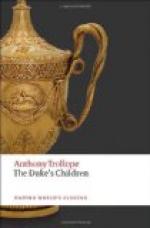‘I won’t have him standing alongside of me on the Heath,’ said his lordship.
‘I don’t know how I’m to help it.’
‘If he’s there I’ll send the horse in;—that’s all.’ Then Tifto found it best to say a few words to Captain Green. But the Captain also said a few words to himself. ’D—– young fool; he don’t know what he’s dropping into.’ Which assertion, if you lay aside the unnecessary expletive, was true to the letter. Lord Silverbridge was a young fool, and did not at all know into what a mess he was being dropped by the united experience, perspicuity, and energy of the man whose company on the Heath he had declined.
The horse was quite a picture to look at. Mr Pook the trainer assured his Lordship that for health and condition he had never seen anything better. ‘Stout all over,’ said Mr Pook, ’and not an ounce of what you may call flesh. And bright! just feel his coat, my Lord! That’s ‘ealth,—that is; not dressing, nor yet macassar!’
And then there were various evidences produced of his pace,—how he had beaten that horse, giving him two pounds, how he had been beated by that, but only a mile course; the Leger distance was just the thing for Prime Minister; how by a lucky chance that marvellous quick rat of a thing that had won the Derby had not been entered for the autumn race; how Coalheaver was known to have bad feet. ’He’s a stout ’orse, no doubt,—is the ‘Eaver,’ said Mr Pook, ’and that’s why the betting-men have stuck to him. But he’ll be nowhere on Wednesday. They’re beginning to see it now, my Lord. I wish they wasn’t so sharp-sighted.’
In the course of the day, however, they met a gentleman who was of a different opinion. He said loudly that he looked on the Heaver as the best three-year-old in England. Of course as matters stood he wasn’t going to back the Heaver with even money;—but he’d take twenty-five to thirty in hundreds between the two. All this ended in the bet being accepted and duly booked by Lord Silverbridge. And in this way Silverbridge added two thousand four hundred pounds to his responsibilities.
But there was worse than this coming. On the Sunday afternoon he went down to Doncaster, of course in the company with the Major. He was alive to the necessity of ridding himself of the Major; but it had been acknowledged that the duty could not be performed till after this race had been run. As he sat opposite to his friend on their journey to Doncaster, he thought of this in the train. It should be done immediately on their return to London after the race. But the horse, his Prime Minister, was by this time so dear to him that he intended if possible to keep possession of the animal.




